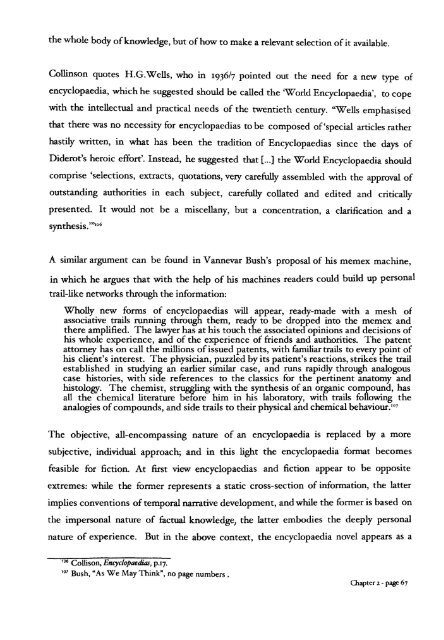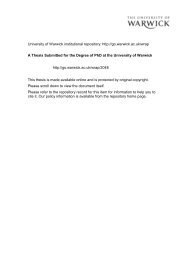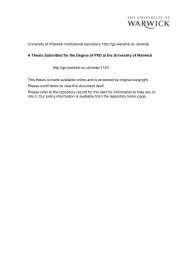From Page to Screen - WRAP: Warwick Research Archive Portal ...
From Page to Screen - WRAP: Warwick Research Archive Portal ...
From Page to Screen - WRAP: Warwick Research Archive Portal ...
You also want an ePaper? Increase the reach of your titles
YUMPU automatically turns print PDFs into web optimized ePapers that Google loves.
the whole body ofknowledge, but ofhow <strong>to</strong> make a relevant selection ofit available.<br />
Collinson quotes H.G.Wells, who in 1936/7 pointed out the need for a new type of<br />
encyclopaedia, which he suggested should be called the 'World Encyclopaedia', <strong>to</strong> cope<br />
with the intellectual and practical needs of the twentieth century. ''Wells emphasised<br />
that there was no necessity for encyclopaedias <strong>to</strong> be composed of'special articles rather<br />
hastily written, in what has been the tradition of Encyclopaedias since the days of<br />
Diderot's heroic effort'. Instead, he suggested that {...} the World Encyclopaedia should<br />
comprise 'selections, extracts, quotations, very carefully assembled with the approval of<br />
outstanding authorities in each subject, carefully collated and edited and critically<br />
presented. It would not be a miscellany, but a concentration, a clarification and a<br />
synthesis."'106<br />
A similar argument can be found in Vannevar Bush's proposal of his memex machine,<br />
in which he argues that with the help of his machines readers could build up personal<br />
trail-like networks through the information:<br />
Wholly new forms of encyclopaedias will appear, ready-made with a mesh of<br />
associative trails running through them, ready <strong>to</strong> be dropped in<strong>to</strong> the memex and<br />
there amplified. The lawyer has at his <strong>to</strong>uch the associated opinions and decisions of<br />
his whole experience, and of the experience of friends and authorities. The patent<br />
at<strong>to</strong>rney has on call the millions ofissued patents, with familiar trails <strong>to</strong> every point of<br />
his client's interest. The physician, puzzled by its patient's reactions, strikes the trail<br />
established in studying an earlier similar case, and runs rapidly through analogous<br />
case his<strong>to</strong>ries, with side references <strong>to</strong> the classics for the pertinent ana<strong>to</strong>my and<br />
his<strong>to</strong>logy. The chemist, struggling with the synthesis of an organic compound, has<br />
all the chemical literature before him in his labora<strong>to</strong>ry, with trails following the<br />
analogies ofcompounds, and side trails <strong>to</strong> their physical and chemical behaviour.':"<br />
The objective, all-encompassing nature of an encyclopaedia is replaced by a more<br />
subjective, individual approach; and in this light the encyclopaedia format becomes<br />
feasible for fiction. At first view encyclopaedias and fiction appear <strong>to</strong> be opposite<br />
extremes: while the former represents a static cross-section of information, the latter<br />
implies conventions oftemporal narrative development, andwhile the former is based on<br />
the impersonal nature of factual knowledge) the latter embodies the deeply personal<br />
nature of experience. But in the above context, the encyclopaedia novel appears as a<br />
106 Collison, Encyclopaedias, p.I].<br />
107 Bush, "As We May Think", no page numbers.<br />
Chapter 2 - page67





